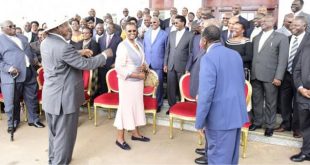
By Ronald Musoke
The Uganda National Examinations Board has finally released the 2013 A-level results today, March 27, with female candidates beating their male counterparts in the humanities.
A total of 116,190 candidates registered for the 2013 examination from 1,710 centres compared to 111,456 candidates from 1334 centres in 2012.
Similarly, a total of 115,380 candidates sat for examinations, compared to 109,974 in 2012, an increase of 4,406 candidates (4.0%).
UNEB noted that, 32,829 (28.7%) passed all the three principal subjects, 28,650 (25.1%) passed at least two principal subjects while 27, 496 (24%) and 22,296 (19.5%) passed at least one principal subject and subsidiary subject respectively. About 3,000 candidates failed completely.
According to Matthew Bukenya, the executive secretary of UNEB, at least 61,479 candidates—those who passed at least two principal subjects— will qualify for admission to various universities in Uganda.
In terms of performance, female candidates performed better than males in History, Economics, Islamic Religious Education, Christian Religious Education, Geography, Literature in English, and Mathematics while male candidates performed better in Science subjects.
Bukenya said although there was an improvement in performance at principal level in Economics, Islamic Religious Education, Christian Religious Education, Physics, Agriculture and Chemistry, the overall performance in History, Entrepreneurship Skills, Literature in English and Biology dropped.
“The overall performance of candidates in the 2013 UACE exams shows that a very high percentage of candidates (97.3%), qualified for the award of the UACE, about the same percentage as in 2012,” he said.
However, although there was improvement in the overall performance of candidates, Bukenya said the candidates’ ability to understand and apply knowledge, as well as analyse and carry out scientific experiments, interpret and draw conclusions from those experiments is still a challenge for many of them.
He said although good quality work was seen from many centres, especially the traditional government aided schools and well established private schools, there was evidence of poor preparation of candidates in many other centres.
As reported in previous years, poor communication skills continued to affect candidates’ ability to express themselves well even though they understood the demands of the questions,” Bukenya said, adding that this was more pronounced in the humanities where questions required extended essay writing.
Bukenya blamed schools that have resorted to examination oriented teaching; thereby limiting candidates to what they expect will be examined and in so doing the schools denied the candidates coverage of areas which the teachers think may not be examined.
“The use of poorly written pamphlets, on which both teachers and students now over-rely, has also affected performance,” Bukenya said.
Bukenya however noted that the 2013 performance may not easily be comparable to 2012 since the Ministry of Education and Sports had a change in policy guidelines which limited UACE candidates to register for not more than three principal subjects.
In addition the ministry compelled students offering science combinations or economics but without mathematics at the principal level to do subsidiary mathematics.
Jessica Alupo, the Minister of Education and Sports said the 2013 results showed several encouraging trends especially in terms of enrollment figures and candidates qualifying for the award of the UACE certificate.
She added that the government will continue with its policy of encouraging students to pursue science subjects because this is what Uganda must do if she is to achieve her Vision 2040.
To access your results using your mobile phone, go to the message menu, type UACE, leave a space, type your index number correctly and send to 6600 if you are on MTN, WARID, AIRTEL or ORANGE.
 The Independent Uganda: You get the Truth we Pay the Price
The Independent Uganda: You get the Truth we Pay the Price



